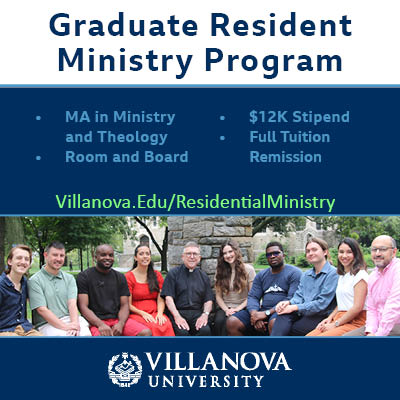Catholic Volunteer Network’s Executive Director, Jim Lindsay shares his thoughts about Mission Congress 2010.
As I write, our staff has just returned from Albuquerque and Mission Congress 2010. The theme of the Congress, God’s Mission, Many Faces: A Portrait of U.S. Catholics in Mission, presented us with a challenge. What is the face of mission today, particularly within this country, and what will our response be to the call to mission?
To help us answer these questions, we had three thought-provoking keynote speakers over the days of the congress, each taking a particular role of canvas, painter or observer.
Fr. Gary Riebe-Estrella, SVD, Professor at Catholic Theological Union, took the part of the canvas. He stated that God’s dream as expressed in the creation story of Genesis is God’s plan for society where all have the opportunity for an abundant live. And it seems that our current globalization process is not taking us toward that Biblical vision. The gaps between the rich and poor continue to grow like never before.
Since the variance in the distribution of wealth continues to widen, contrary to God’s dream for us, our mission work today demands social analysis and change, even in our own dioceses and parishes where there are large gaps. And just as there are economic inequalities that are unjust, the disparities with regard to cultural power are grave as well. Fr. Gary wondered if we spend too much energy trying to have newer immigrants fit in to our “American Way” rather than honoring the different cultural gifts each race and ethnicity brings to our parishes.
Among his key concerns then are that the mission of the church needs to include the challenging of the economic gaps in our society and the power of the dominant culture that eliminates the value of so called minority cultures in the U.S. Thus, being a missionary entails being a teacher of social analysis and a bridge-builder.
Sr. Janice McLaughlin, MM, President of the Maryknoll Sisters, acted as the painter. She talked of having been “turned upside down” at different times in mission, stating that such experiences help one to see the world with new eyes. Using beautiful imagery of her African encounters, she said that animals have something to teach us, like the giraffe that is flexible enough, despite its vast size, to be able to get to the good leaves by going past the thorns. And the elephants that no longer grow tusks as they had tragically adapted to slaughter by humans. Would that we were always that flexible in our approaches to mission!
Abuse of creation has been a major concern for Sr. Janice and for the mission church. She also asked us missioners to focus on the injustices faced by women and children who suffer human trafficking. She described the three weeks she spent in solitary confinement in Rhodesia (now Zimbabwe) as the best retreat she ever had, when she experienced the closeness of God like never before and the solidarity she received from her fellow prisoners had a profound impact.
She posed the question, “When have you been turned upside down?” And then she asked what we had learned from that experience? Finally, Sr. Janice asked what worries us most about global realities. And what gives us hope for the future? These are key things we missioners need to ask ourselves often.
While she complimented various religious missionary congregations and groups who are celebrating special anniversaries this year, she wanted us to appreciate the new faces of mission, such as lay missioners, students doing semesters abroad, short-term missioners, and those participating in immersion trips. Experiencing mission causes their worlds to turn upside down, too!
Finally, Cardinal Oscar Rodriguez, Archbishop of Tegucigalpa, Honduras, served as the observer. He said that he doesn’t like the term “ordinary time” in referring to the liturgical calendar. Every day of a baptized Christian’s life is extraordinary.
He strongly emphasized developing a personal relationship with the living Christ. He noted how Juan Diego was transformed by his encounter with Jesus. As a result of this, he overflowed with gratitude, enthusiasm and joy, which led him to communicate that experience with others. Then the cardinal urged us to follow Juan Diego’s example as a new, alive mission church by doing such things as: challenging our pastors to awaken the spirit of service in the church; not proselytizing but rather sharing our joy of knowing Jesus with those who have left the church and with agnostics and atheists; working for institutional reforms and becoming more ecumenical in our faith-sharing efforts; dialoguing with others, speaking to them about our experience of faith in the Lord, rather than simply sharing the doctrines of our Catholic faith; keeping the poor and excluded before our eyes; realizing that our attitude is sometimes more important than even the content of our faith; and last, but not least, not ignoring the role of lay people in the Church.
There were several trends or common threads that could be derived from the speakers’ presentations: Today, lay missionaries and volunteers are in the forefront of Catholic mission. It is important that we empower lay people for mission through short and long-term volunteer work and parish and diocesan partnerships; Mission today must include seeking social justice and respect for creation. Catholic missiology today is concerned with the relationship between evangelization and inculturation of the Gospel. The transformation of the world is an integral part of the preaching of the Gospel; The need to make better use of the media and to communicate with less church jargon so as to be able to reach out to secular society. Particularly if we wish to engage young people, we must utilize social networking opportunities; We are coming to a better appreciation of the need for a personal relationship with Jesus who empowers us with joy, compassion and enthusiasm for God’s reign. By deepening our relationship with Jesus, so as to truly know him and his love, through prayer, meditation and study of our own faith and tradition, we will be able to better dialogue with members of other churches and faiths with personal conviction; Seeking to share our faith in Jesus through dialogue instead of simply stressing the importance of doctrine. Mission must take into account that the Gospel cannot be forced upon anyone; and the Necessity of ecumenical mission efforts, not competition, in dealing with those from other Christian traditions. An important discussion concerns how to proclaim the Gospel in the light of Christ’s call for the unity of his disciples. We have not yet achieved the oneness that Jesus prayed for and we know that our divisions can be a stumbling block that prevents us from effectively proclaiming the Gospel.
I heard many positive comments about the presence of Catholic Volunteer Network members and partners at the Mission Congress. There was a wonderful mix of clergy (including 22 bishops), religious, and lay people (some of whom came from Christian traditions other than Catholic.) We had participants whose ages spanned sixty years or more.
I am grateful to the members of Catholic Volunteer Network, who traveled to Albuquerque to be part of this rich experience. We look forward to having many more members with us for next year’s annual National Conference in Philadelphia, from November 15-18, 2011. Stay tuned for more information!
For those of you who joined us in Albuquerque – what sticks out in your mind as some of the most important messages delivered during the Congress? We look forward to hearing your thoughts!


 Thousands of faith-based service opportunities can be at your fingertips with the RESPONSE. Download the latest edition today!
Thousands of faith-based service opportunities can be at your fingertips with the RESPONSE. Download the latest edition today!
